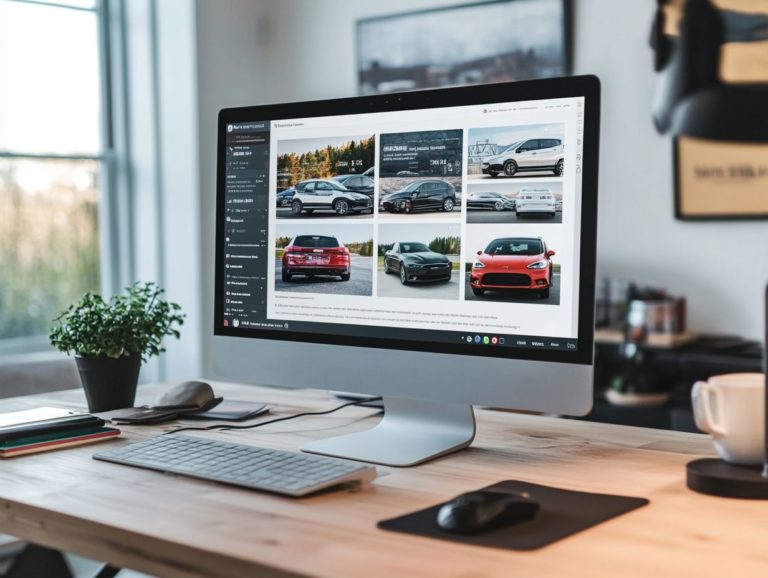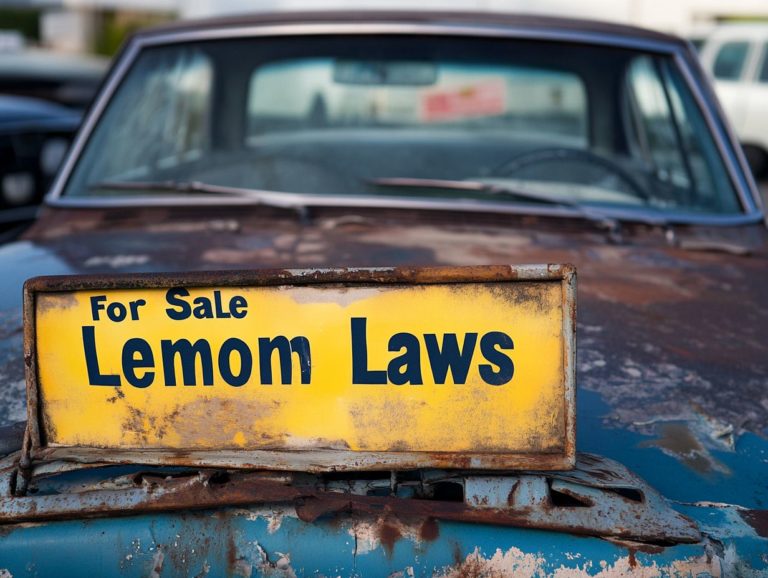5 Tips for Buying Used Cars with High Mileage
Buying a used car can be tricky, especially when you’re eyeing those high-mileage options. But with the right strategies and a bit of knowledge, you can uncover a reliable vehicle that aligns perfectly with your budget.
This guide presents five essential tips to navigate the process from conducting thorough research to mastering the art of negotiation for the best price. You’ll delve into the intricacies of high mileage, which means the car has been driven a lot, usually over 100,000 miles, weighing its benefits and risks. You’ll learn how to assess a car’s condition and discover strategies to keep your used car performing optimally for years to come.
Jump in and equip yourself to make a savvy, informed purchase!
Contents
- Key Takeaways:
- 1. Do Your Research
- 2. Get a Car History Report
- 3. Have a Mechanic Inspect the Car
- 4. Take a Test Drive
- 5. Negotiate the Price
- What Is Considered High Mileage for a Used Car?
- Frequently Asked Questions
- What are some tips for buying used cars with high mileage?
- Is it safe to buy a used car with high mileage?
- What is considered high mileage for a used car?
- Are there any red flags to watch for when buying a used car with high mileage?
- Should I buy a used car with high mileage if it has a warranty?
- Can I finance a used car with high mileage?
Key Takeaways:

- Do your research before buying a used car with high mileage to ensure you are making an informed decision.
- Obtain a car history report and have a mechanic inspect the car to uncover any potential issues.
- Take a test drive and negotiate the price to get the best deal on a used car with high mileage.
1. Do Your Research
Thorough research is key when buying a used car. In Colorado Springs, various manufacturers offer many options tailored to your needs.
Keep average mileage and overall vehicle condition in mind as you explore your choices.
To make the most informed decision, dive into consumer reports that shed light on the reliability records of different models. By understanding the average prices specific to your region, you can easily determine if a particular listing is reasonably priced or just a bit inflated.
Gathering detailed maintenance records will help you assess how well the vehicle has been cared for and spot any potential future issues. When comparing different models, pay attention to critical aspects such as fuel efficiency and safety ratings.
Using resources like Phil Long Dealerships can significantly streamline this process, providing a wealth of information and expert assistance to ensure you take a well-rounded approach to purchasing a reliable used vehicle.
2. Get a Car History Report
Acquiring a car history report is essential when you re considering a used car. It offers crucial insights into ownership history, maintenance records, and any potential issues that could impact the vehicle’s reliability and resale value.
Using reputable services like Carfax and Autocheck is imperative for you as a potential buyer. These reports provide in-depth information about previous accidents, odometer readings, and title status.
Pay close attention to the service history, as it can reveal how well the car has been maintained over the years. This examination is crucial when looking at certified pre-owned vehicles, as understanding the car s past can significantly influence its future performance and value.
A clean history not only instills confidence in your purchase but also gives you the power in negotiating a fair price.
3. Have a Mechanic Inspect the Car
Before you finalize your purchase of a used car, it’s vital to get a detailed inspection from a trusted mechanic. This step ensures you fully understand the vehicle’s condition, any potential wear and tear, and issues that could impact its performance and longevity.
The inspection should dive deep into essential components, starting with engine performance to assess efficiency and soundness. Mechanics should pay close attention to safety features like brakes and airbags, ensuring these critical systems operate flawlessly.
Indicators of wear and tear, such as tire conditions and fluid levels, also deserve meticulous scrutiny. Keep in mind that the focus may shift based on the vehicle’s mileage. High-mileage cars might require more attention to engine and transmission components, while low-mileage vehicles may show fewer concerns but should still undergo checks for any hidden defects.
Making these assessments will give you the power to make a well-informed decision.
4. Take a Test Drive
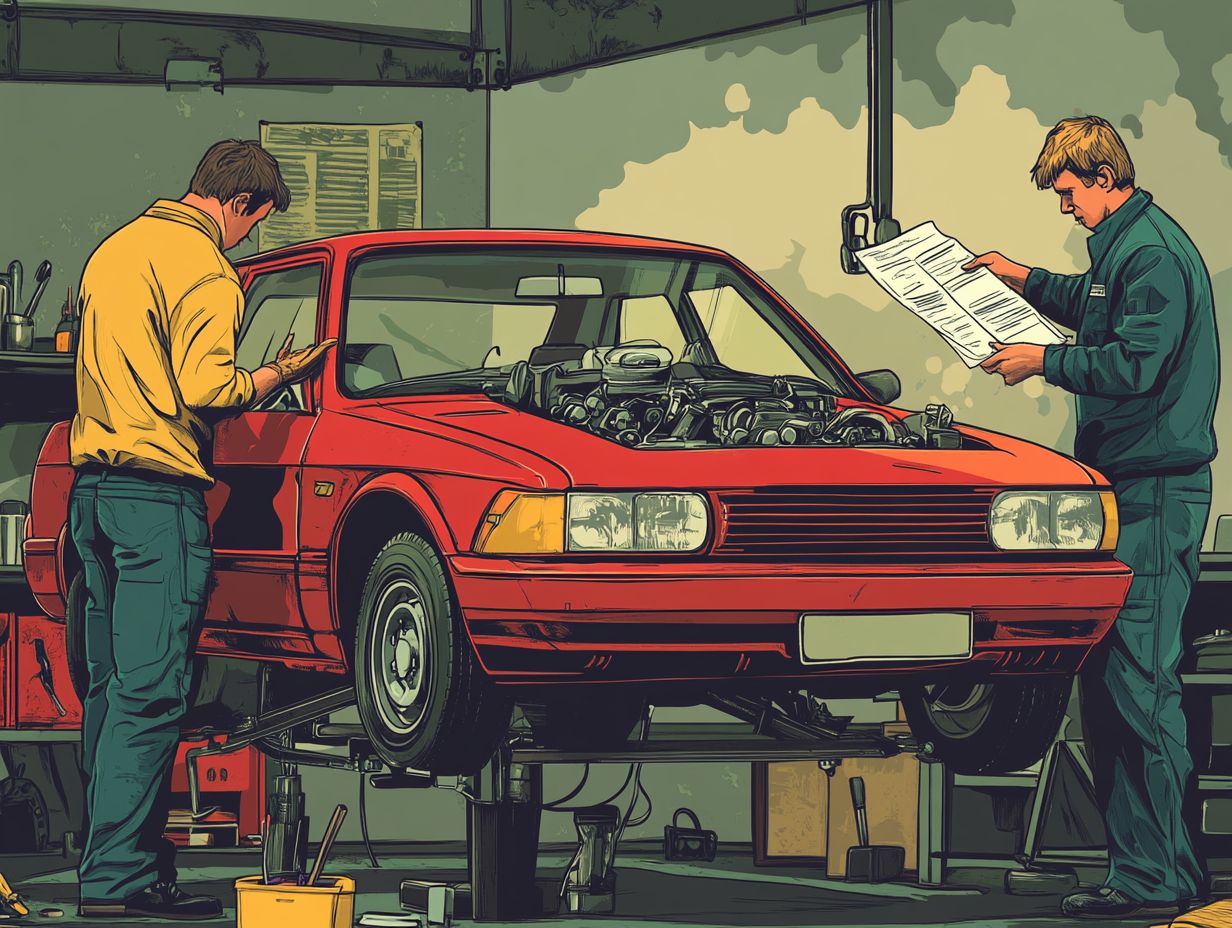
Taking a test drive is an essential step in your used car buying journey. It provides you with the opportunity to evaluate the vehicle’s performance, comfort, and safety features, ensuring it aligns perfectly with your commuting needs.
To maximize this experience, prepare a detailed checklist to assess crucial elements such as the engine’s responsiveness during acceleration, the effectiveness of the braking system, and the overall steering feel. These factors can significantly influence your driving comfort.
It s also wise to test the vehicle under various road conditions, including city traffic, highways, and even a few rough terrains. This approach helps gauge its suspension and handling capabilities. A comprehensive test drive reveals the car’s performance on the road and offers valuable insights into whether it delivers optimal mileage for your daily use.
5. Negotiate the Price
Negotiating the price of a used car is a crucial step in the buying journey. Having a solid grasp of market trends and comparable used car prices can significantly boost your negotiating advantage with sellers.
By equipping yourself with knowledge about the trade-in value of your current vehicle, you can present an offer that truly reflects its worth. Being aware of average used car prices in Colorado Springs helps you identify deals that might be too good to be true or, conversely, overpriced.
You can also use repair costs to negotiate. Pointing out necessary repairs can lead sellers to rethink their initial asking price, paving the way for a more balanced agreement. Each of these strategies works together to empower you throughout the negotiation process.
What Is Considered High Mileage for a Used Car?
High mileage for a used car is generally considered to be over 100,000 miles. However, this number can shift depending on various factors, such as the vehicle’s make, model, and maintenance history throughout its life.
For example, vehicles recognized for their durability and reliability, like certain trucks or sedans, may still perform admirably even after crossing that 100,000-mile mark. On the other hand, luxury models might start to show signs of wear sooner than you d hope.
Low-mileage vehicles, typically defined as having less than 50,000 miles, often catch your eye for their potential longevity and reduced maintenance costs, making them highly desirable.
Average mileage is usually estimated based on annual norms, which hover around 12,000 to 15,000 miles. Keep in mind that higher mileage often means more wear and tear, which can scare off buyers and lower resale value!
However, a well-maintained high-mileage vehicle can still fetch a respectable price if it showcases strong performance and boasts a thorough service history.
What Are the Benefits of Buying a Used Car with High Mileage?
Buying a used car with high mileage can bring you a multitude of benefits, not the least of which are significant cost savings. However, if you’re considering purchasing a new vehicle, it’s wise to explore 5 tips for first-time new car buyers to ensure you make a well-informed decision. Buying a high-mileage car means you get a great deal on a model that has already lost its initial value!
Choosing high-mileage vehicles often means you ll encounter lower initial purchase prices compared to their low-mileage counterparts. For example, you might discover that luxury brands like BMW or Audi are within reach, enabling you to secure these impressive models at a fraction of their original cost.
If the vehicle has been meticulously maintained, it s likely to boast better reliability, easing your common concerns about durability. This makes a high-mileage option not only economical but also an astute choice for enjoying premium features without the extravagant price tag.
What Are the Risks of Buying a Used Car with High Mileage?
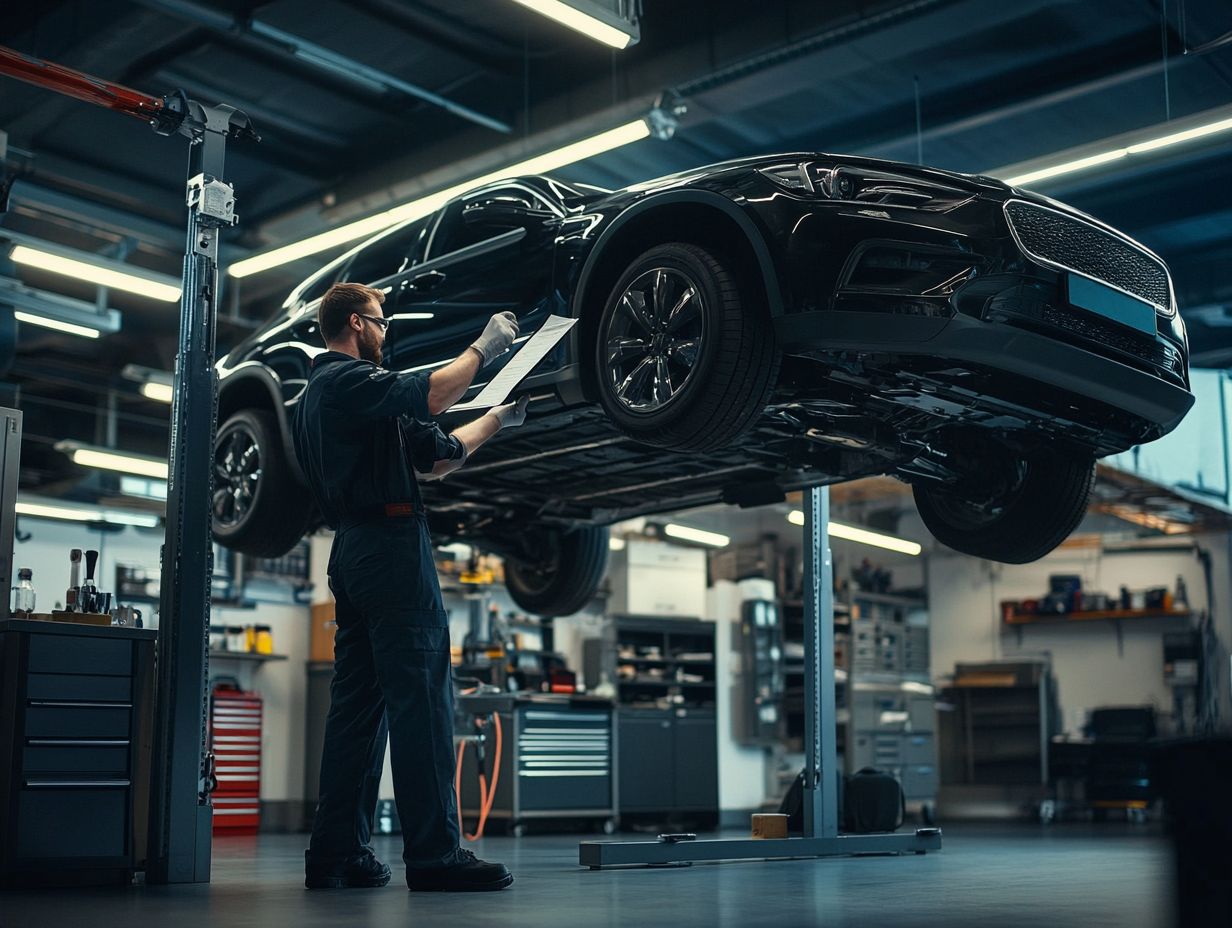
While purchasing a high-mileage used car can have its perks, you must remain vigilant about potential risks. To navigate these challenges effectively, consider these tips for buying used luxury cars, which address concerns like increased wear and tear, higher maintenance costs, and engine longevity.
These vehicles often have a history of extensive use, which may lead to costly repairs. Issues with the transmission, brakes, or exhaust systems can arise. The safety features that protect passengers may also lose effectiveness over time, which is a significant concern if safety is your top priority.
To reduce these risks, conduct thorough inspections. Seek comprehensive vehicle history reports and ensure regular maintenance. Additionally, knowing how to approach a used car purchase can be invaluable. By closely monitoring performance and making informed decisions, you can help ensure that your high-mileage vehicle remains a dependable mode of transportation.
How Can You Tell If a Used Car Has Been Well-Maintained?
Identifying whether a used car has been well-maintained is essential for assessing its future performance. This hinges on a careful look at detailed maintenance records, inspection reports, and the vehicle’s overall reliability history.
Start by requesting service records that provide details on oil changes, tire rotations, and significant repairs undertaken. Examining these documents allows you to see how regularly the car has been serviced and whether any critical issues were addressed promptly.
Inspecting maintenance records offers valuable insight into the vehicle’s current condition. Signs of a well-maintained car include:
- Even tire wear
- Clean fluids
- A well-functioning engine
These indicators suggest that the previous owner took excellent care of the vehicle. A thorough check of the tires, including tread depth and pressure, along with clear, clean fluids, will bolster your confidence in making a sound purchasing decision.
What Are the Most Reliable Used Cars with High Mileage?
When considering high-mileage cars, certain models truly shine for their reliability. Consumer reports and vehicle assessments often highlight them for long-term performance and owner satisfaction.
You ll frequently see vehicles like the Toyota Camry, Honda Accord, and Subaru Outback making the cut. These cars consistently earn favorable ratings for their durability and low breakdown rates.
What makes these cars stand out? It s about robust engine performance, exceptional manufacturing standards, and a strong community of support from dedicated owners and mechanics.
Understanding these qualities can significantly enhance your decision-making process. By seeking out these top-rated models, you ll ensure your investment is in a vehicle that delivers stellar performance and promises enduring reliability.
How Can You Extend the Lifespan of a Used Car with High Mileage?
Extending the lifespan of your high-mileage used car demands diligent maintenance and proactive care. This includes strategies tailored to the needs of both diesel and gasoline engines for optimal performance.
Prioritize regular oil changes. Not only do they lubricate the engine, but they also provide valuable insight into its overall health. Timely repairs are equally essential; addressing minor issues before they escalate can save you from costly damage down the line.
Keep a close watch on wear and tear, especially for components like belts and hoses that naturally degrade over time. Different engine types may require specific attention; for instance, diesel engines often benefit from more frequent fuel filter replacements.
Adopt these essential practices now to boost the longevity and reliability of your high-mileage vehicle!
Frequently Asked Questions
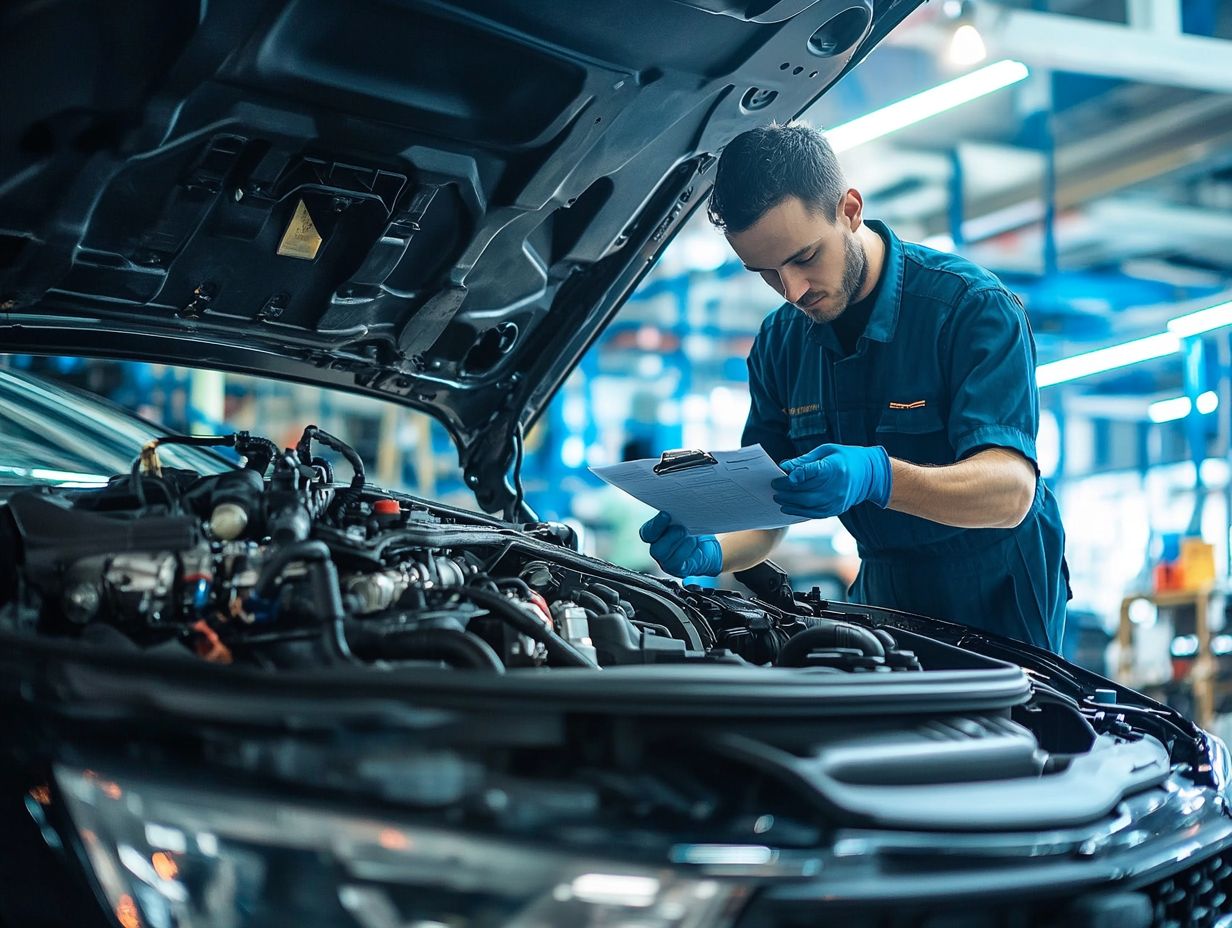
What are some tips for buying used cars with high mileage?
1. Research the car’s history. Get a vehicle history report to check for accidents or issues.
2. Have a mechanic inspect the car. They can spot potential problems and give you an idea of future costs.
3. Check maintenance records. Look for a car that has had regular oil changes and necessary services.
4. Take it for a test drive. Pay attention to how it performs and any unusual sounds or feels.
5. Negotiate the price. If you find issues or the mileage is high, don’t hesitate to ask for a lower price. For more strategies, check out these tips for financing a new vs. used car.
Is it safe to buy a used car with high mileage?
Buying a used car with high mileage can be a smart choice. Just make sure to do your research and consider 5 ways to save money on a used car purchase and have it inspected by a mechanic first.
What is considered high mileage for a used car?
High mileage usually means around 100,000 miles or more. However, this can vary by make and model.
Are there any red flags to watch for when buying a used car with high mileage?
Yes, look out for a lack of maintenance records, visible wear and tear, or unusual noises during the test drive. These signs may indicate underlying issues.
Should I buy a used car with high mileage if it has a warranty?
A warranty can provide peace of mind. Just read the terms to understand what s covered and for how long.
Can I finance a used car with high mileage?
Yes, you can finance it. Just be aware that lenders may charge higher interest rates and might require a larger down payment.

